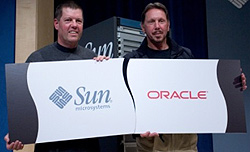One (Common) Marketing Tactic That Can Ruin Your Business…

Scott McNealy, former Sun Microsystems CEO, and
Larry Ellison of Oracle announce a closer partnership
in 2006, which led to Oracle acquiring Sun in 2009. There’s one (unfortunately common) marketing tactic out there that can actually take down your entire business. This is the true story of how I watched it unfold at a Fortune 500 company…
Back in 2000, the company that I worked for, Cobalt Networks, was acquired by Sun Microsystems. I interviewed, and was accepted for, a position in Sun’s marketing department, working on Sun.com. As part of Sun’s marketing department, I got to see some of the advertisements Sun created to sell products to potential customers.
Sun’s potential customers were mainly large government agencies and giant corporations. These government agencies and corporations were used to buying products from IBM, Oracle, and the like. (Imagine a customer so large that your billion-dollar company is still considered a “startup”!)
The Tactic
Sun’s main tactic was to go negative in its advertising. One ad I remember them being so proud of (they actually photographed it in the San Francisco office I worked out of) was a shot of a man in a suit. He had dollar bills in his pockets, and the ad made it appear as if they were being “vacuumed” out of his pockets. The tagline was, essentially, “This is what IBM does to your company.”
The request for a negative campaign like this came straight from the top–from Scott McNealy, who was CEO at the time. Sun was negative toward everyone else in the industry. IBM? Hated ‘em. Microsoft? The devil! Apple? A joke! Oracle? Pfft!
At the same time I was working there, I was studying sales psychology. The books verified something I had already suspected: When you go negative in your advertising, the net effect is that the potential customer thinks more about the thing you’re being so negative about. (That explains why the “War on Drugs” actually increased usage of many drugs during its lifespan.)
I also made a friend in the sales department. Over lunch at In-N-Out Burger one day, he told me something interesting. He said, “I hear this over and over again–a large organization requests Sun, IBM, and others to make a presentation about their products. IBM is first. They show a great presentation about their product line. Then comes another vendor. They show up and do another fantastic presentation about how amazing their products are. Then it’s Sun’s turn. Sun does a presentation–about how awful everyone else’s products are!”
He continued, “The net effect is this. Most of these people have bought products from the company Sun’s presentation is bashing. So they get to thinking, ‘Well, IBM’s product isn’t as bad as Sun makes it out to be.’ And then, they go buy from IBM. We lose the sale, again and again and again.”
I was stunned. “Haven’t you taken this up with Sun’s management?” I asked. (Scott McNealy in particular practiced an “open door strategy” where he appeared to be responsive to suggestions.)
“Oh, yes,” he said. “But they don’t care. They like this sales strategy.”
Leading from the Ego
It was then that I realized two things: One, Sun was leading from an egotistical perspective of “we’re better than everyone else, and we’re going to prove it by bashing everyone else.” And it wasn’t making them many sales. Two, if they didn’t change, they weren’t going to survive as a company. Not only was the sales culture bad, but it created rot within the company as well. The company culture was oppressively negative, and it attracted people who enjoyed complaining and bashing others.
More importantly, though, I realized I had to take this to heart. When I ran my hosting company, I remembered this clearly. People loved to ask me, “Why are you better than [a competitor’s name]?”
In response, I would always ask who they were hosting with now. If it was the same competitor they just named, I was careful to not bash the competitor–because that would be bashing the choice that they made. Instead of indulging my ego, I said, “I completely understand why you’ve made the choice you have. You wanted a good deal.”
Then I would find out what had happened that made them want to change hosting providers. If they were just shopping around for a better deal, I’d tell them honestly that we probably weren’t the best fit. But if something had happened–they’d had an outage recently, or they needed room to grow–that’s when I’d be able to go into my preferred sales strategy, which was showing them why we were a much better choice for them. I’d point out our redundant power, have them meet our employees, and do a datacenter tour. By the end of the tour, 90% of the time, they were ready to sign up with us. Then I wouldn’t hesitate to collect their credit card information and get them set up!
Despite its questionable company culture, working at Sun taught me a valuable lesson. You can’t serve your customers effectively when you’re busy bashing your competitors. And you can’t survive as a business (or as an ideal) if your main issue is “We’re not this other thing.”
What are you saying to your customers? Are you presenting your business in the best possible light–or inadvertently turning your customers toward a potential competitor?
Recommended Reading:
- One Million Dollars, The Hard Way. Ever wonder how I sold a business for $1.1 million? This post gives all the details.
- Are You Making This Common Mistake (That Could Ruin Your Business)? Here’s another big mistake (and a true story) that could really kill your business.
- How Writing a Story Could Strangle Your Business. What is “writing the story”? Are you doing it? If so, you could be leaving a lot of money on the table…


